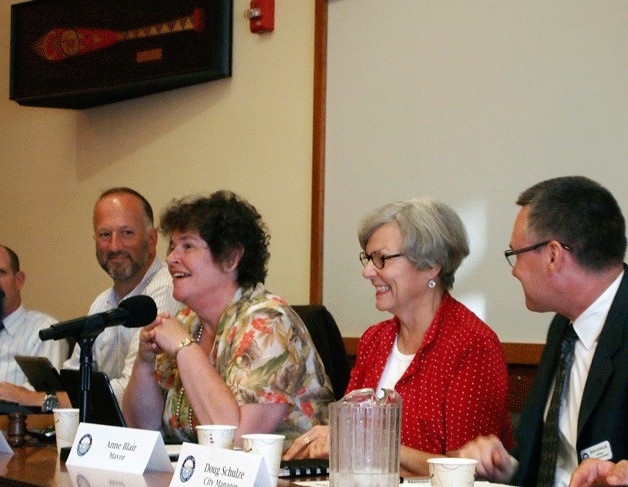POULSBO — North Kitsap’s leaders are looking down the road toward a series of considerable bumps and no one, alone, has the resources to fix them before we all get there.
But together, they stand a chance of crafting a smooth ride.
That was the takeaway from a July 1 meeting at Poulsbo City Hall with representatives from the City of Poulsbo, the City of Bainbridge Island and the Suquamish Tribe.
Kitsap County Commissioner Rob Gelder also attended.
It was an opportunity for all parties to discuss mutual challenges, two in particular: cooperative law enforcement and Highway 305 traffic. While the message on law enforcement was clear — each department relies on each other and cooperation needs to expand — the conversation among leaders centered on traffic between Poulsbo and the Bainbridge ferry terminal.
“We have to do something. We cannot do nothing,” said Poulsbo Councilman Jim Henry.
Bainbridge Island Public Works Director Barry Loveless gave a presentation showing solutions to corridor congestion such as signal synchronization, roundabouts, reversible express lanes and more. But while jurisdictions can make small improvements, there are a few potholes that no one can avoid.
Congestion is increasing between Poulsbo and Bainbridge Island, Loveless said.
He noted that currently, the commute time between the island and Poulsbo during peak hours is around 30 minutes, but it is expected to take as long as 1 hour by 2030. Accidents occur at a higher rate on the corridor than the state average, Loveless added.
A solution will require cooperation between all parties.
The corridor
“I would like us to have a conversation that is not so vehicular centric,” Gelder said. “As we look at the entire corridor we need to look at mass transit,” Gelder said. “How do we move goods and people around without relying on just cars?”
“I don’t necessary equate (mass transit) with busses,” he added
Others echoed the sentiment.
“Public transportation is going to have to be made to work,” Henry said.
Others took another approach.
“It might be best to envision an end point and work back,” said Poulsbo Councilman Ed Stern. “If money were not an object, and we could plan right now for an ideal, what would that be?”
“If we could enlarge Highway 305, if we could make the bridge four lanes, and make it four lanes from Poulsbo to the bridge, and make it four lanes to the ferry, is that what we would do?” Stern asked.
Four lanes didn’t seem like an ideal to some.
“The four lanes makes me bristle a bit,” said Bainbridge Island Councilman Roger Townsend.
“I do think that mass transit is the better solution,” he said. “That seems like an avenue for success. I don’t think four lanes will come out of the comprehensive plan.”
Henry humorously echoed that thought.
“I remember what happened last time we brought up ‘four lanes’ and our friends on Bainbridge Island almost blew up the Agate Pass Bridge,” Henry later quipped.
The concern becomes heavier as council members consider the changing demographics of the north end. North Kitsap is growing faster than the south end. With that growth comes more jobs on the Kitsap Peninsula, but also more ferry commuters who use Highway 305.
“I think you will find as we do forecasting with population growth and growth of jobs, there is more off island than there is on island,” said Councilman Steve Bonkowski.
Stern continued the thought.
“I myself have commuted from Poulsbo to catch the ferry in the morning,” Stern said. “I was surprised at how many people live off island who commute onto the island because they can’t afford housing there. There are wait times before getting onto the island. There is a truth that more and more of workers are living off island and commuting onto the island.”
The bridge
There are only two methods of accessing the island; the Agate Pass Bridge and the ferry.
“The big bottle neck is the Agate Pass Bridge,” Loveless said.
All parties talked in terms of eventually replacing the bridge; an endeavor that would come at a cost of $80-100 million, according to estimates presented by Loveless.
Poulsbo Mayor Becky Erickson and Bonkowski volleyed the notion of exploring funding mechanisms for a new bridge, such as tolls. Others mentioned future grants. But no one had a clear idea of how to pay for any significant solution to transit problems.
Bainbridge Island Mayor Anne Blair noted that she would like to have a plan for moving forward, with all parties involved, by fall. Bainbridge Island is currently reviewing its comprehensive plan, making it an opportune time to address such matters in conjunction with the city’s neighbors.
“It’s going to take a multi-pronged approach,” Henry said. “That’s what we are going to have to get used to doing. It can be done, but you got to make your mind up on what you want to do. But we don’t know what we want to do yet.”



